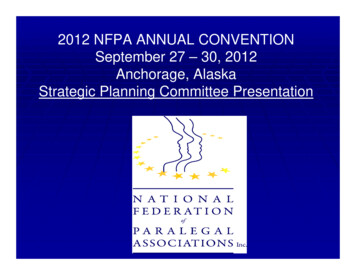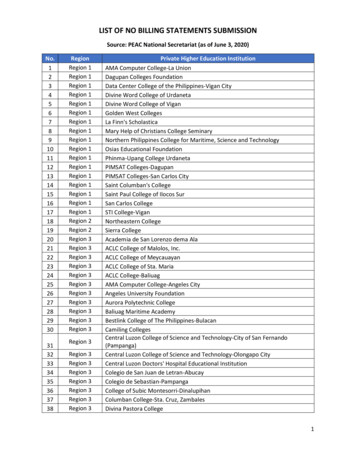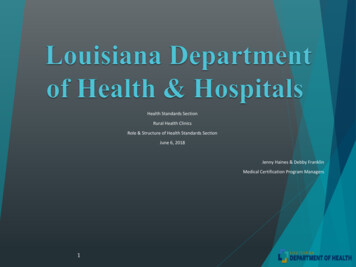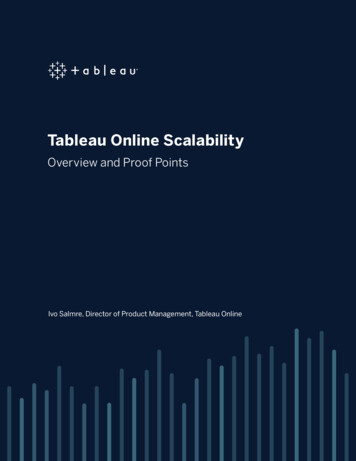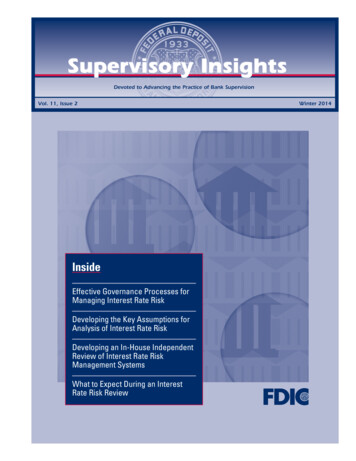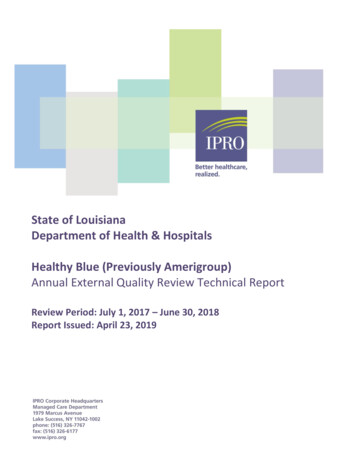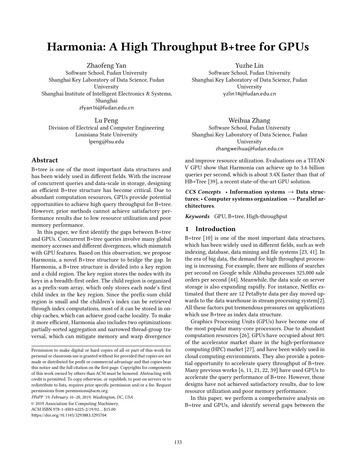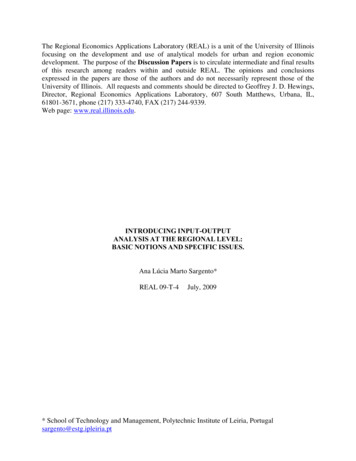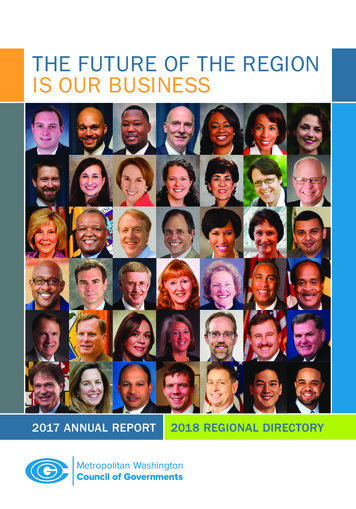
Transcription
THE FUTURE OF THE REGIONIS OUR BUSINESS2017 ANNUAL REPORT2018 REGIONAL DIRECTORY
COVER (COG LEADERSHIP, BOARD)ROW 1Matthew Letourneau, COG BoardChairman, Loudoun CountyRobert White, Jr., COG Board ViceChairman, District of ColumbiaDerrick L. Davis, COG Board ViceChairman, Prince George’s CountyPhil Mendelson, COG President,District of ColumbiaKaren Toles, COG Vice President, PrinceGeorge’s CountyPhyllis Randall, COG Vice President,Loudoun CountyKate Stewart, COG Secretary-Treasurer,City of Takoma ParkROW 2Charles Allen, Transportation PlanningBoard Chair, District of ColumbiaKatie Cristol, Human Services PolicyCommittee Chair, Arlington CountyLibby Garvey, Chesapeake Bay and WaterResources Policy Committee Chair,Arlington CountyDanielle Glaros, Region Forward CoalitionChair, Prince George’s CountyMary Lehman, Climate, Energy, andEnvironment Policy Committee Chair,Prince George’s CountyHans Riemer, Metropolitan WashingtonAir Quality Committee Chair,Montgomery CountyDavid Snyder, Emergency PreparednessCouncil Chair, City of Falls ChurchABOUT COGThe Metropolitan Washington Council of Governments (COG) isan independent, nonprofit association that brings area leaderstogether to address major regional issues in the District ofColumbia, suburban Maryland, and Northern Virginia. COG’smembership is comprised of 300 elected officials from 24 localgovernments, the Maryland and Virginia state legislatures, andU.S. Congress.ACKNOWLEDGMENTSDirectory entries are updated by each local government and includecity and county departments and offices in areas related tocommittees at COG. A special thanks to the individuals who assistCOG with this process.ROW 3Ruth Anderson, Prince William CountyRushern Baker, III, Prince George’s CountyGeorge Barker, Virginia General AssemblyRoger Berliner, Montgomery CountyMuriel Bowser, District of ColumbiaSharon Bulova, Fairfax CountyHector Cendejas, City of Manassas ParkAnnual Report Editors: Steven Kania, Megan GoodmanROW 4Christian Dorsey, Arlington CountyBrian Feldman, Maryland General AssemblyJohn Foust, Fairfax CountyJan Gardner, Frederick CountyPenelope Gross, Fairfax CountyEmmett Jordan, City of GreenbeltIsiah Leggett, Montgomery CountyACCOMODATIONS POLICYROW 5David Meyer, City of FairfaxCraig Moe, City of LaurelNancy Navarro, Montgomery CountyBridget Newton, City of RockvilleMichael O’Connor, City of FrederickFrank Principi, Prince William CountyG. Frederick Robinson, City of BowieROW 6Ken Robinson, Charles CountyAllison Silberberg, City of AlexandriaTodd Turner, Prince George’s CountyPatrick Wojahn, City of College ParkMark Wolfe, City of ManassasRobert Wu, City of GaithersburgRashad Young, District of ColumbiaRegional Directory Editors: Steven Kania, Laura Ambrosio, Pat WarrenCOG Communications Director: Jeanne SaddlerDesign: BlueHouseAlternative formats of this document are available upon request.Visit www.mwcog.org/accommodations or call (202) 962-3300 or(202) 962-3213 (TDD).TITLE VI NONDISCRIMINATION POLICYThe Metropolitan Washington Council of Governments (COG) fullycomplies with Title VI of the Civil Rights Act of 1964 and relatedstatutes and regulations prohibiting discrimination in all programsand activities. For more information, to file a Title VI relatedcomplaint, or to obtain information in another language, visitwww.mwcog.org/nondiscrimination or call (202) 962-3300.El Consejo de Gobiernos del Área Metropolitana de Washington(COG) cumple con el Título VI de la Ley sobre los DerechosCiviles de 1964 y otras leyes y reglamentos en todos susprogramas y actividades. Para obtener más información,someter un pleito relacionado al Título VI, u obtenerinformación en otro idioma, visite www.mwcog.org/nondiscrimination o llame al (202) 962-3300.
THE FUTURE OF THE REGIONIS OUR BUSINESS2017 ANNUAL REPORT / 2018 REGIONAL DIRECTORY
CONTENTS2017ANNUAL REPORTOpening Message. 1Highlights. 2Programs/Events. 8Publications. 10Awards. 12Annual Meeting. 14FY 2017 Budget Highlights. 16MARC station in the City of Laurel(skabat169/Flickr)
2018 REGIONAL DIRECTORYMETROPOLITAN WASHINGTON COUNCIL OF GOVERNMENTSThe COG Corporation. 19COG Board of Directors. 20National Capital Region Transportation Planning Board (TPB). 22Metropolitan Washington Air Quality Committee (MWAQC). 24COG Policy Committee and Advisory Bodies. 26COG Public/Private Partnerships. 27Public Input. 28Senior Management Staff. 29MEMBER JURISDICTIONSDistrict of Columbia. 30Maryland. 32Town of Bladensburg. 32City of Bowie. 33Charles County. 34City of College Park. 35City of Frederick. 36Frederick County. 37City of Gaithersburg. 39City of Greenbelt. 40City of Hyattsville. 41City of Laurel. 42Montgomery County. 43Prince George’s County. 45City of Rockville. 47City of Takoma Park. 48Virginia. 49City of Alexandria. 49Arlington County. 51City of Fairfax. 53Fairfax County. 54City of Falls Church. 56Loudoun County. 57City of Manassas. 59City of Manassas Park. 60Prince William County. 61STATE AND FEDERAL DELEGATIONSState of Maryland. 63Commonwealth of Virginia. 66U.S. Congress. 68
2017ANNUALREPORTSilver Spring (Dan Reed/Flickr)
MESSAGE FROM THE CHAIRMANAND EXECUTIVE DIRECTORIn 1957, a group of about 40 officials from the District of Columbia,Maryland, and Virginia gathered to discuss issues of mutual interest.Almost immediately they found value in building connections andexchanging information. They saw the potential in working together todevelop solutions to shared challenges in metropolitan Washington andformed an organization, which we now call the Metropolitan WashingtonCouncil of Governments (COG).Matthew Letourneau2018 COG Board ChairmanCOG went on to become the home of the region’s Metropolitan PlanningOrganization (MPO), and over the past 60 years has evolved into the hubfor regional partnership. COG has been at the forefront of critical issues inour region, from revitalizing the Potomac River, to building and maintainingMetrorail, to emergency preparedness after 9/11, and so much more.In 2017, we continued this important work alongside members andpartners, building on our strong legacy. We convened the Regional Opioidand Substance Abuse Summit, helped to organize the creation of theMetrorail Safety Commission and efforts to secure new dedicated fundingfor the system, celebrated the continuing positive trend in air quality, andfacilitated greater coordination to boost the region’s economy. We evenwelcomed a new member—the City of Laurel.Chuck BeanCOG Executive DirectorThe leadership of COG, and the over 300 elected officials that are members,is needed now more than ever. Although it is meaningful to reflect on howfar we have come as an organization and as a region, we could not be moreexcited for the year ahead. After all, the future of the region is our business.Throughout 2018, COG will focus on a variety of challenges, fromtransportation funding, to air and water quality, to workforce development.The Board of Directors will be working on two important new initiatives:enhancing the region’s approach to managing major traffic incidents, andestablishing best practices for the safety and security of public buildings,including schools. We will also be looking for opportunities to tell the storyof our dynamic region, and highlight our collaborative efforts to ensure itsprosperity and progress.We look forward to working alongside you in the year ahead.Learn more about how area leadersare working together at COG for thefuture of the region in this video:www.mwcog.org/aboutcogCOG 2017 ANNUAL REPORT1
HIGHLIGHTSHEALTH AND SAFETYEnsuring a safe and healthy region for all ofthe region’s residents involves planning andcoordination across borders, and in 2017,COG convened leaders on a number of criticalissues. At the Regional Opioid and SubstanceAbuse Summit, policymakers and public healthand safety professionals from across theDistrict of Columbia, Maryland, and Virginiamade connections, shared information, andpledged to work more closely together torespond to the growing opioid and substanceabuse epidemic.The COG-organized event held in LinthicumHeights, Maryland drew about 500 people andfeatured opening remarks by the region's topelected officials.Regarding emergency coordination and response,COG coordinated a major exercise, involving morethan 700 first responders and actors, whichwas designed to prepare for the possibility of acomplex coordinated terror attack. The exercisewas staged at six sites in the District of Columbia,suburban Maryland, and Northern Virginia.COG and the Greater Washington Board of Tradealso hosted a briefing featuring top business,transportation, and security officials to help theregion prepare for the 2017 Inauguration. Andon Inauguration Day, when a group of protestersbecame violent, various law enforcement agencieswere able to share critical information about thesituation with one another via the Regional IncidentCommunication and Coordination System (RICCS),a 24/7 system owned and maintained by COG thatdelivers messages to more than 1,500 officials.2COG 2017 ANNUAL REPORT ONY ROSETCharles CountyCOG 9-1-1Directors CommitteeChairmanI think that citizensin the metropolitanWashington region are extremely lucky tohave COG involved in public safety andtransportation matters . . . A number ofvery valuable things have been born outof this cooperation and collaboration—like interoperability.More from Rose in this COG Q&A:www.mwcog.org/tonyrose
Opioid Summit: COG Executive Director Chuck Bean, Kaiser Foundation Health Plan of the Mid-AtlanticStates President Kim Horn, Virginia Governor Terry McAuliffe, D.C. Mayor Muriel Bowser, and Maryland GovernorLarry Hogan at the Opioid Summit. Attendees at the Opioid Summit.COG 2017 ANNUAL REPORT3
HIGHLIGHTSTRANSPORTATIONArea officials advanced several importantinitiatives aimed at improving the region’stransportation system. The National CapitalRegion Transportation Planning Board (TPB) atCOG began developing Visualize 2045, a newlong-range transportation plan for the region.The plan will show all regionally significanttransportation investments planned through2045, as well as a select group of unfundedinitiatives, and provide detailed analysis to helpdecision makers and the public “visualize” theregion’s future.The TPB also approved a new planningtool, a regional map that identifies “EquityEmphasis Areas” or geographic areas withhigh concentrations of low-income and minoritypopulations to assess whether those areas maybe disproportionately impacted by transportationprojects in the region’s long-range plan. Rosslyn Station (Elvert Barnes/Flickr)4COG 2017 ANNUAL REPORT TPB conducts survey research for Visualize 2045.
In addition, the TPB approved a set of five priorityinitiatives for additional study and potentialinclusion into Visualize 2045. These currentlyunfunded initiatives, which were analyzed andrecommended by the TPB’s Long-Range Plan TaskForce, focus on optimizing land-use balance in theregion, adding bus rapid transit and transitways,improving Metrorail capacity, increasing traveldemand management and telework, andexpanding the network of express toll lanes.Following a complicated process, areajurisdictions and the federal governments gaveapproval to the new, independent MetrorailSafety Commission. COG supported theDistrict, Maryland, and Virginia in creating thecommission, and the states are working togetherto get it running so it can assume safety oversightof Metro from the Federal Transit Administration.COG’s Metro Strategy Group of elected officialsand Metro Technical Panel of city and countymanagers and financial experts focused onhelping the region ensure the transit system’slong-term financial sustainability. At the end ofthe year, the strategy group proposed, and theCOG Board endorsed, a resolution calling for 500 million in new, dedicated funding for Metroto implement its 15.5 billion, 10-year capitalimprovement program. COG continues to supportadditional dialogue by area officials as they forgea long-term dedicated funding agreement.SHARON BULOVAFairfax CountyCOG Metro StrategyGroup ChairmanWe believe thatour recom mendations,in addition to the otherMetro proposals that have been advancedthis year, have helped forge consensusaround Metro’s critical capital needs andensured that long-term dedicated fundingfor Metro remains our top priority until afinal agreement is reached . . .More about COG’s work to restore Metro:www.mwcog.org/restoringmetro Virginia Governor Terry McAuliffe, Premier of OntarioKathleen Wynne, D.C. Mayor Muriel Bowser, andMaryland Governor Larry Hogan on a trade missionto Canada. (@TerryMcAuliffe/Twitter)ECONOMYIn 2017, COG continued its focus onstrengthening the region’s economiccompetitiveness in a variety of ways. To startthe year, COG released its State of the Region:Human Capital Report, which provided asnapshot of the region’s demographics, growthforecasts, and workforce trends. During the first phase of the HQ2 process, COGsupported its members by providing data, maps, andreports to local jurisdictions as they prepared theirproposals for Amazon.As part of the Global Cities Initiative, COG andits partners developed a regional export plan andbegan exploring the creation of a regional tradeservices organization. COG also helped supporta joint trade mission to Canada, led by MayorMuriel Bowser and Governors Larry Hogan andTerry McAuliffe, to explore trade, tourism, andinvestment opportunities.COG 2017 ANNUAL REPORT5
HIGHLIGHTS Howard University (Ted Eytan/Flickr)KENYAN MCDUFFIEDistrict of Columbia2017 COG Board ofDirectors Chairman. . . Research by[COG] and partners isshowing us that thefuture economic success of the regionalso hinges on our ability to maximize theknowledge, skills, and abilities of arearesidents—the region’s human capital . . .We must continue to invest in the creationof quality places—centers of activity andopportunity around our region that willappeal to the future workforce.More from McDuffie in thisWashington Business Journal op-ed:www.mwcog.org/kenyanmcduffie6COG 2017 ANNUAL REPORTCOG brought together elected officials, Metro staff,real estate developers, and planning directors for aforum on transit-oriented development, which helpsthe region attract and retain employers and talent.Participants shared best practices, opportunities forcollaboration, and strategies to overcome challengesto spur development near Metro stations.When Amazon announced a search for a secondheadquarters, the COG Board directed staff towork with local city and county managers to exploreopportunities for regional coordination. COG providedits jurisdictions with a library of datasets and reports,interactive maps, and messaging for their proposalsto help promote the region’s competitive advantages.ENVIRONMENTThroughout the year, officials on COG committeesshowed strong leadership by reaffirming theircommitment to air, water, and climate programs.For example, the COG Board passed a resolution insupport of continued full funding for the ChesapeakeBay Program and other federal water quality programsfor fiscal year 2018 and beyond. Members spread theword about measurable improvements in the healthof the Bay and about how local governments, waterand wastewater utilities, companies, individuals, andthe federal government must all continue to do theirpart to ensure this vital work is uninterrupted.
COG members supported continued effortsto reduce greenhouse gas emissions. A MultiSector Working Group of subject matter expertsfrom local governments and regional and stateagencies released a set of emissions-reductionstrategies. The work guided development of theupdated Climate and Energy Action Plan adoptedby the Climate, Energy, and Environment PolicyCommittee offering voluntary and flexible actionsto help the region meet its 2020 climate goal.The region recorded a fifth straight year with noCode Red unhealthy air days, and the MetropolitanWashington Air Quality Committee (MWAQC)approved a plan that demonstrates the region’sachievement in attaining the U.S. EnvironmentalProtection Agency’s 2008 standard for ground-levelozone pollution. However, the region still must meetthe 2015 ozone standard, which is more protectiveof public health and an ongoing focus of MWAQC.COG also forged a partnership with the U.S. ArmyCorps of Engineers to conduct a coastal floodingstudy. The three-year study will provide the regionwith tools to assess climate impacts on coastalarea flooding and better understand vulnerabilitiesto infrastructure.DANIEL SZECity of Falls Church2017 COG ChesapeakeBay and WaterResources PolicyCom mittee ChairmanThe Chesapeake Baywatershed is vast, so progress has beenpossible only because of federal, state,and local partnerships. Improvementsare largely thanks to the EnvironmentalProtection Agency’s Chesapeake Bayrestoration program, with the support of20 other federal programs, six states andthe District, 1,800 localities, 27 academicinstitutions, and 60 organizations. Patuxent River Park in Prince George's County(Chesapeake Bay Program/Flickr) COG and U.S. Army Corps Baltimore District staff kickoff the Coastal Storm Risk Management Study.More from Sze in this Washington Postop-ed: www.mwcog.org/danielszeCOG 2017 ANNUAL REPORT7
PROGRAMS/EVENTS Clean Air Partners celebrates its 20th Anniversary at the 2017 Best in Air Awards. (Clean Air Partners)CLEAN AIR PARTNERSIn May, Clean Air Partners celebrated 20 yearsof educating the greater metropolitan BaltimoreWashington region about the health risksassociated with poor air quality and the impactof everyday actions on the environment. COG andthe Baltimore Metropolitan Council created thepartnership in 1997 to complement efforts tomeet federal air quality standards. City of Fairfax Mayor David Meyer participatesin the kickoff of the fall Street Smart safetyawareness campaign.STREET SMARTIn November, the region’s twice-yearly StreetSmart pedestrian and bicycle safety campaignunveiled new ads at its fall kickoff event inthe City of Fairfax at the Old Town Square. TheShattered Lives-themed ads convey the fragilityof people’s lives, and can be tailored by localjurisdictions for their own communities.BIKE TO WORK DAY Virginia Department of Transportation Assistant District Administrator Rene'e Hamilton, a TPBMember, participates in Bike to Work Day.(VDOT/Twitter)8COG 2017 ANNUAL REPORTIn May, more than 18,700 commuters fromacross the region took part in one of thenation’s largest Bike to Work Day events andbroke the regional record for participation.The event is sponsored by COG’s CommuterConnections program and the Washington AreaBicyclist Association and featured 85 pit stopsacross the region.
COG launches its Go Recycle campaign in April. Protect Your Pipes provides tips for preventingdamage to residents' plumbing and the environment.GO RECYCLEIn April, COG launched its Go Recycle mediacampaign, which educated residents aboutrecycling and encourages them to recycleeverywhere—at work, at home, and in publicspaces. Several ads have been customized forindividual jurisdictions explaining why recyclingmatters in different communities.PROTECT YOUR PIPESIn November, COG’s Community EngagementCampaign, comprised of water and wastewaterutilities, ran Protect Your Pipes advertisementsin movie theaters during the holiday season andboosted its social media outreach. Protect YourPipes highlights proper disposal of fats, oils andgrease, prescription drugs, and wipes, to keepthese materials from plugging up householdplumbing and sewer systems.COOPERATIVE PURCHASINGThis year, COG laid the groundwork for a majorcooperative purchasing project in 2018, asubscriber radios bid for first responders thatinvolves 60,000 units over 10 years with a potentialsavings of 30-90 million. COG also advancedbids on electric vehicles and infrastructure, waterand wastewater treatment chemicals, emergencymedical supplies, and diesel fuel. ICHOLAS MAJETTNPrince George’s County2017 COG ChiefAdministrative OfficersCommittee ChairmanCOG is invaluable. Ifwe acted independentof COG, then the respective jurisdictionswould spend a lot more money . . . Throughthe [cooperative purchasing] program, PrinceGeorge’s has saved two million dollars inpurchasing fuel per year. We are lookingat purchasing other items such as radiosthrough the program . . .More from Majett in this COG Q&A:www.mwcog.org/nicholasmajettCOG 2017 ANNUAL REPORT9
PUBLICATIONSCOG staff members produce a variety of publications to inform areaofficials, stakeholders, and the public about regional initiatives,issues, and trends. To view these reports, plans, and newsletters,visit www.mwcog.org/publications.10COG 2017 ANNUAL REPORT1256
1 State of the Region: Human Capital Report2 Homelessness in Metropolitan Washington: Resultsand Analysis from the 2017 Point-in-Time Count ofPersons Experiencing Homelessness3 State of the Commute Survey Report5 Improving the Region's Air: Air QualityTrends for Metropolitan Washington 2005-20166 Commercial Construction Indicators7 TPB News: News and Updates from the Region's MPO8 Connections: Regional News from COG4 Annual Report on Crime and Crime Control3478COG 2017 ANNUAL REPORT11
AWARDSThroughout the year, COG celebrates the amazing contributions of arearesidents, organizations, and member governments. From outstanding fosterparents, to climate and energy leaders, to businesses offering innovativecommuter benefits to their employees, there are countless efforts underway tohelp the region achieve its goals. Read more about COG awardees atwww.mwcog.org/awards.1312COG 2017 ANNUAL REPORT
1 Loudoun County couple Robert and Marlayna Diaz—pictured with Loudoun County Supervisor MatthewLetourneau and Chair Phyllis Randall—are among the“Foster Parents of the Year” recognized by the COG Board.3 Arlington Initiative to Rethink Energy, MundoVerde Bilingual Public Charter School, andCity Blossoms, Inc. receive 2017 Climate andEnergy Leadership Awards.2 Cadmus Group Vice President of Human ResourcesKerri Morehart accepts her organization’s EmployerRecognition Award from Commuter Connections, presentedby COG Transportation Planning Director Kanti Srikanth and2017 TPB Chairman Bridget Newton.4 Alexandria City Manager Mark Jinks receivesthe 2017 Inspiring Leader Award from COG’sInstitute for Regional Excellence. Prince George’sCounty Chief Administrative Officer NicholasMajett (not pictured) was named 2017 VisionaryLeader Award recipient.24COG 2017 ANNUAL REPORT13
ANNUAL MEETING1At the Annual Membership Meeting on December 13, government, business,and nonprofit leaders gathered to celebrate COG’s 60th anniversary andhighlight the importance of regional partnership. Speakers, includingthen-Virginia Lieutenant Governor-elect Justin Fairfax, reflected on the regionalwork in 2017 that built on COG’s legacy—such as the Opioid Summit, thecreation of the Metro Safety Commission, and improving air quality—and considered the possibilities for the region in the year ahead. Read moreabout the meeting and our honorees at www.mwcog.org/cog2017.1 P rince George's County Council Members Mary Lehman, Dannielle Glaros, and Todd Turner with special guestJustin Fairfax (second from left).2 2 017 Transportation Planning Board Chairman Bridget Donnell Newton (Rockville) is presented with the Elizabethand David Scull Metropolitan Public Service Award by Arlington County Board Chair Jay Fisette and COG ExecutiveDirector Chuck Bean.3 D C Water CEO and General Manager George Hawkins accepts the Ronald F. Kirby Award for CollaborativeLeadership from WSSC General Manager Carla Reid, and COG Deputy Executive Director Stuart Freudberg.4 T he Coalition for Smarter Growth, represented here by its Champions Council members Steven E. Jones and LeslieSteen, Advocacy Manager Pete Tomao, and Deputy Director Aimee Custis, accepts the Regional Partnership Award.14COG 2017 ANNUAL REPORT
234COG 2017 ANNUAL REPORT15
FY 2017 BUDGET HIGHLIGHTS1%7%6%7%4%FY 2017REVENUESOURCES75%SOURCEAMOUNT ( ) Federal Funds40,828,900 State & District Funds1,880,700 Member Dues3,914,200 Service Fees, Donors & Misc.3,264,300 Regional Funds & User Fees3,694,200 Building & Interest Revenue782,200Total16COG 2017 ANNUAL REPORT54,364,500
COG serves as the region’sdesignated pass-through entityfor certain federal programs,making funds available tomember jurisdictions, non-profitorganizations, and businesseswithin the region to supportvarious initiatives, programs,and projects. The followingare examples:2%4%13%FY 2017REVENUE BYPROGRAM45%36% U ASI (Urban Area SecurityInitiative) Securingthe Cities (a programfocused on enhancing theregion’s ability to detectradiological materials)16,400,000 E nhanced Mobility forSeniors and Individualswith Disabilities2,200,000 T IGER (TransportationInvestment GeneratingEconomic Recovery)1,900,000SOURCE TransportationAMOUNT ( )24,701,400 Homeland Security & Public Safety 19,710,700 Environment6,798,200 Strategic Initiatives & Member Services 1,944,000 Community PlanningTotal*Subrecipient pass-through funds1,210,20054,364,50020,500,000COG 2017 ANNUAL REPORT17
2018 REGIONALDIRECTORY19th Street in the District (Elvert Barnes/Flickr)182018 REGIONAL DIRECTORY
COGTHE COG CORPORATIONTPRESIDENTPhil Mendelson(202) 724-8032District of ColumbiaCouncil Chairmanhe Metropolitan Washington Council of Governments (COG)is an independent, nonprofit association that brings arealeaders together to address major regional issues in the Districtof Columbia, suburban Maryland, and Northern Virginia. COG’smembership is comprised of 300 elected officials from 24 localgovernments, the Maryland and Virginia state legislatures, andU.S. Congress.Policies are set through the COG Board of Directors, theNational Capital Region Transportation Planning Board, and theMetropolitan Washington Air Quality Committee. These threeboards are responsible for a broad range of issues under the COGumbrella. Supporting committees help shape programs throughthe dedicated work of a wide array of public servants, from policechiefs to social workers.VICE PRESIDENTKaren R. Toles(301) 952-3690Prince George’s CountyCouncil MemberVICE PRESIDENTPhyllis Randall(703) 777-0204Loudoun County ChairSECRETARY-TREASURERKate Stewart(240) 338-9333City of Takoma Park Mayor2018 REGIONAL DIRECTORY19
COG BOARD OF DIRECTORSTCHAIRMANMatthew Letourneau(703) 777-0204Loudoun County Supervisorhe Board of Directors is the Council of Governments’ governingbody and is responsible for its overall policies, functions,and funds. Board members are appointed each year by theparticipating local governments and by caucuses of state legislativedelegations from the region. The board takes action on committeerecommendations, discusses current and emerging regionalproblems, and receives briefings on issues facing the region.Meetings are open to the public, and representatives from themedia frequently attend. Please visit www.mwcog.org/eventsfor the latest information on meeting dates and times.DISTRICT OFCOLUMBIAMuriel Bowser(202) 727-2643District of Columbia MayorVICE CHAIRMANRobert White, Jr.(202) 724-8174District of ColumbiaCouncilmemberPhil Mendelson(202) 724-8032District of Columbia CouncilChairmanRashad Young(202) 727-7316District of Columbia CityAdministratorMARYLANDVICE CHAIRMANDerrick L. Davis(301) 952-3426Prince George’s CountyCouncil
Prince George's County Hans Riemer, Metropolitan Washington Air Quality Committee Chair, Montgomery County David Snyder, Emergency Preparedness Council Chair, City of Falls Church ROW 3 Ruth Anderson, Prince William County Rushern Baker, III, Prince George's County George Barker, Virginia General Assembly Roger Berliner, Montgomery County



